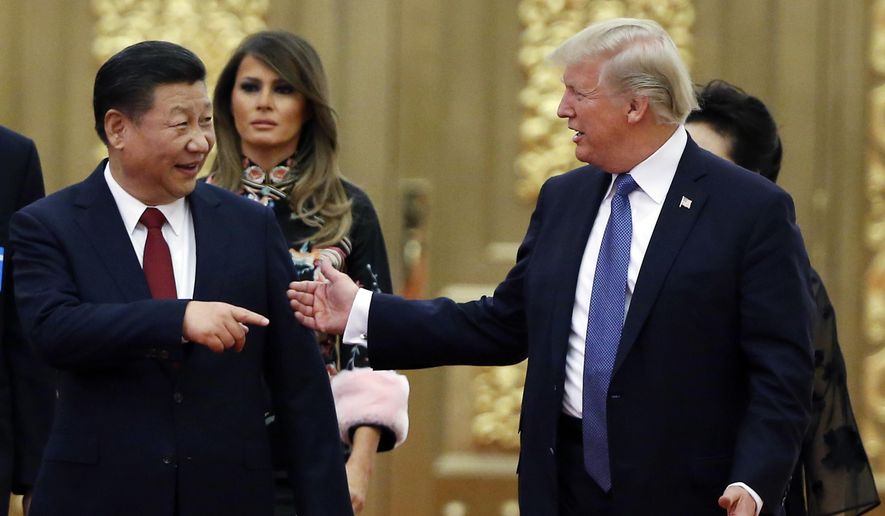The Trump administration announced Friday new tariffs on $50 billion worth of Chinese goods, intensifying a trade dispute while seeking continued Chinese support in keeping pressure on North Korea.
The 25 percent tariff hits 1,102 products categories, nearly the total on a list that was put on hold last month for trade talks. Mr. Trump had been expected to significant trim that list.
China has threatened to retaliate with tariffs on $50 billion of U.S. goods. The escalating dispute stoked fears of a full-blown trade war between the world’s two largest economies.
Mr. Trump described it as more of a business deal, stressing his personal relationship with Chinese president Xi Jinping.
“I have a wonderful relationship with President Xi. We’ll all work it out. He understands it’s unfair,” Mr. Trump said on “Fox & Friends.”
Mr. Xi made similar comments Thursday about his personal relationship with Mr. Trump. He said he wants to grow the U.S.-China relations.
U.S. Trade Representative Robert Lighthizer said the administration was playing defense against what he called the “unprecedented threat” of China’s theft of intellectual property and cyber attacks.
He accused Beijing of “aggressively working to undermine America’s high-tech industries and our economic leadership through unfair trade practices and industrial policies like ’Made in China 2025.’”
Made in China 2025 is a policy rolled out in 2015 to comprehensively upgrade China’s industry, with an emphasis on his-tech including pharmaceuticals, and expend China’s influence globally.
Mr. Trump has made import taxes part of his “America First” policies to counter China’s trade barriers and unfair trade practices. He wants to reduce America’s $375 billion trade deficit with China.
Sen. Marco Rubio, a Florida Republican and leading China hawk, heralded the tariffs as a “theft tax.”
“China is systematically stealing the fruits of American innovation in an attempt to displace us as the most powerful economy and military in the world,” he said. “Hitting China with a ’Theft Tax’ isn’t protectionism, it’s American leadership.”
The administration previously imposed tariffs on steel and aluminum. The move irritated trading partners including Canada, Mexico and the European Union.
The tariffs focus on products from China’s industrial sector including aerospace, information and communications technology, robotics, industrial machinery, new materials and automobiles.
The list does not include goods commonly purchased by American consumers such as cellphones or televisions, according to the administration.
The tariff policies have met opposition from trading partners, free-trade advocates in Congress and industry leaders in America.
The administration did reduce the original list of 1,333 product categories to 888 product categories worth about $34 billion. Another 284 products worth $16 billion were than added to the new list for the total of 1,102 precuts worth about $50 billion.
Jay Timmons, president of the National Association of Manufacturers, said bilateral trade deals are better than trade wars.
“There is no question that China cheats and that its unfair trade practices and intellectual property theft are hurting America’s manufacturing workers,” he said. “To put an end to these threats and redefine the U.S.-China economic relationship, manufacturers are calling for a new path forward: a fair, binding, enforceable bilateral trade agreement.”
The Retail Industry Leaders Association said in a statement: “The Administration promised ’maximum pain on China, minimum pain on American consumers,’ but America’s families and farmers will be the ones hurt most by these tariffs. Tariffs don’t punish China, they raise the cost for consumers. For many American families, these increased costs will wipe out any gains from tax reform.”
Mr. Trump’s tough trade action was applauded by Senate Minority Leader Charles E. Schumer, who typically opposes the president’s every move.
“The president’s actions on China are on the money. China is our real trade enemy, and their theft of intellectual property and their refusal to let our companies compete fairly threatens millions of future American jobs,” the New York Democrat said.
He added, “While we await further details on this trade action, President Trump is right on target.”
Other Democrats who generally support import taxes and cracking down on China still found fault with Mr. Trump.
“While we simply cannot let China’s unfair trade practices go unchecked, this president’s erratic approach to resolving this issue gives me pause,” said Sen. Mark Warner of Virginia.
He pointed to the Trump administration’s decision to lift a ban on Chinese cell phone maker ZTE, a major employer that faced bankruptcy because of the U.S. imposed ban for illegally doing business with Iran and North Korea.
The Pentagon also deemed ZTE a security threat because the phones theoretically could be used to spy on Americans.
Mr. Trump made a deal to save ZTE as a personal favor to Mr. Xi.
Rep. Bill Pascrell Jr., New Jersey Democrat, said he supported tariffs but the ZTE decision confused the policy.
“I fear a chaotic and seemingly ad hoc trade policy will be ineffective in confronting China. Our trade policy must reflect the needs of U.S. workers and their families, not the whims of an executive who flatters dictators,” he said.
• S.A. Miller can be reached at smiller@washingtontimes.com.




Please read our comment policy before commenting.